In this week’s review of Court Judgments, we look at the Supreme Court’s observations noting that conviction cannot be based solely on an unreliable witness, the Bombay High Court’s verdict regarding unauthorised occupants of Mumbai International Airport and its observation regarding the complainant’s extra-judicial actions, and Delhi High Court’s order about provisions & limitations under Right to Education Act.
Supreme Court: Conviction cannot be based solely on the testimony of a wholly unreliable witness
The Supreme Court Bench consisting of Justice BR Gavai and Justice Hima Kohli observed that when the Court finds that a witness is “wholly unreliable”, neither conviction nor acquittal can be based on the testimony of such a witness. This observation was made in an appeal before the Supreme Court.
In this case, the Trial court has earlier convicted 5 individuals under Section 148, 302 read with Section 149 of the Indian Penal Code. This was appealed in the Madhya Pradesh High Court and was dismissed. In the appeal before Supreme Court, it was contended that the witness Anmol Singh could not have witnessed the incident and therefore the conviction based on the testimony is impaired.
This was opposed by the State, which contended that a minor contradiction or inconsistency that cropped up in the evidence of the witness cannot be a ground to disbelieve the truthfulness of the testimony of the witness. The bench referred to an earlier case – Vadivelu Thevar vs. The State of Madras (1957)

Based on the evidence on record, the bench observed that the witness Anmol Singh could not have witnessed the incident. It observed that the testimony falls under the third category.

The Supreme court bench therefore proceeded to allow the appeals and quashed the earlier orders of conviction by the High court and the trial court.

Bombay HC: Upholds eviction of unauthorised occupants from Mumbai International Airport
In the case, Becharabhai B.Chauhan vs. Mumbai International Airport Pvt Ltd, the Bombay High Court upheld the eviction orders passed against a group of unauthorised occupants, who claimed tenancy rights on the premises of Mumbai International airport.
As per the case details, Airport authorities had moved eviction applications under Section 28-D of the Airport Authority of India Act, 1994, seeking eviction of the petitioners from the structures situated on the Airport Premises. The petitioners challenged this eviction application stating that they were occupying these structures for the last 40 years as tenants of one Mr. Ambroce Creado. Documents including Ration cards, Property Tax bills, Electricity Bills, Aadhar cards, etc. were furnished by the petitioners.
However, during the cross-examination, the petitioners admitted that they could not establish their rights over these structures and also cannot establish that the land underneath the structures is owned by the aforementioned landlord. Creado, the landlord has withdrawn his suit against the airport in March 2013 itself. As per the eviction officer, the petitioners were occupying the land without any authority and hence are directed to vacate the Airport premises.
Single Judge Bench of Justice Sandeep K. Shinde noted that as per the evidence on record, the airport premises is part of larger land acquired by the Airport Authority of India in 1947 under the Land Acquisition Act, 1894. Hence, even if the owner himself tries to retain possession, he will become a trespasser. Hence, the judge concluded that the eviction orders passed against the petitioners as unauthorised occupants of airport premises call for no interference.
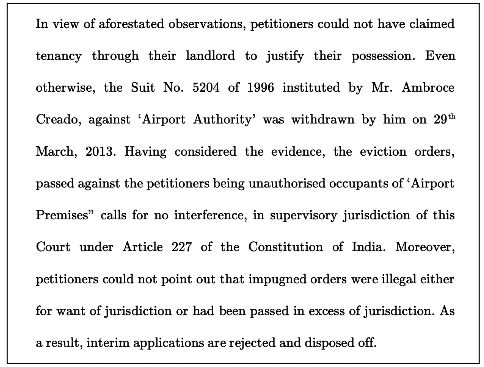
Delhi HC: Right to Education under RTE Act cannot be unconditionally enforced against Private Unaided schools
A division bench comprising of acting Chief Justice Vipin Sanghi and Justice Sachin Datta observed that while the Right of Children to Free and Compulsory Education Act, 2009 guarantees the right to education, it does state that the right can be unconditionally enforced against a private unaided school.
This observation was made while hearing a plea– filed by a minor through his father. The plea was filed challenging Rule 35 (Striking off the name from the rolls) and 167 (Name of the student to be struck off for non-payment of fees and contributions) of the Delhi School Education Rules, 1973.
The contention of the plea was that these rules are ultra vires to Articles 19(1) and 21A read with the provisions of the Right of Children to free and compulsory Education Act, 2009 and also contrary to the provisions of Section 75 of Juvenile Justice Care and Protection Act, 2015.
Regarding the validity of Rule 35 & 167 of Delhi School Education Rules, 1973, the bench noted that the act was enacted for better organization and development of school education in the city.
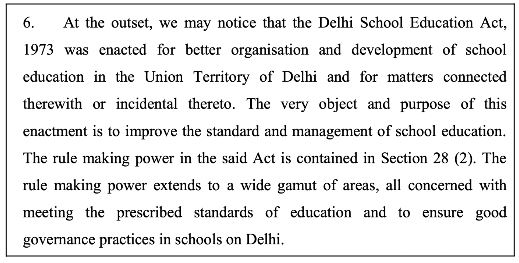
The Court observed that Section 12 of the RTE Act delineates the extant of responsibilities of the school for free and compulsory education of government schools, aided schools, and un-aided schools.
It is of the view that the independent and distinct framework of the Delhi School Education Act and the provision of RTE rule out any question of Rules 35 and 167 of the Delhi School Education Rules impinging on the provisions of the RTE Act.
While the RTE Act guarantees the right to education, it nowhere states that the said right can be unconditionally enforced against a private unaided school.
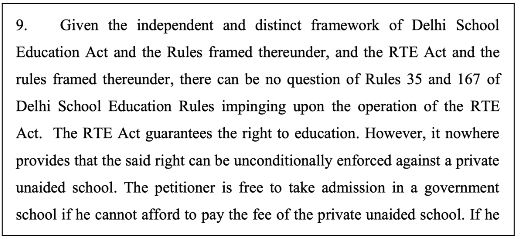
The court further stated that if the petitioner belongs to the EWS category, he may apply under that category to seek a waiver of the school fee.
Allowing the claim of the petitioner would mean that even a private unaided school would not be able to charge any fee even though they have to meet all the expenses, which is completely untenable.
The court also noted that there is no repugnancy between Section 75 of the Juvenile Justice Act and rules 35 & 167 of Delhi School Education Rules, 1973.
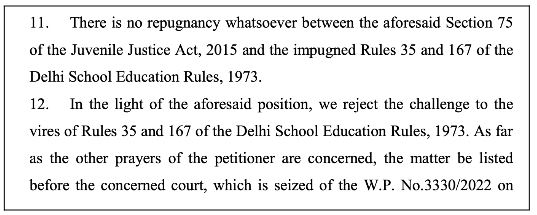
Bombay High Court: Can’t seek ‘Extra-Judicial Remedies’ to pressurize prosecution
In the case of Dr. Lekha Rajesh Visaria vs. The State of Maharashtra & Ors, the Bombay High Court has pulled up the complainant teacher for putting up banners seeking the principal’s arrest.
The court proceeded to grant anticipatory bail to the principal accused of hurling casteist remarks, a punishable offence under the SC/ST Act, at an “under-performing” teacher.
As per the case details, Dr. Lekha Visaria, the appellant had approached the High Court for anticipatory bail after an FIR under section 3(1)(r) of the Scheduled Castes and Scheduled Tribes (Prevention of Atrocities) Act,1989 was registered.
The complainant, a teacher at Swami Vivekanand School was allegedly pulled up and asked to apologize after several mistakes were found in the mark sheet & evaluation. Other teachers were also asked to do the same.
It was alleged that on 15 August 2021, after the flag hoisting ceremony, the principal insulted the complainant regarding her teaching skills. She complained to the trustee but was served a notice of dereliction the next day.
Later, on 05 October 2021, the teacher was summoned to the principal’s cabin stating that the apology letter was not given. It is then that the caste slur was allegedly made. The complainant alleged that two other teachers entered the cabin later and the tirade continued even in front of them. The teacher was asked to teach for lower classes instead of her Standard 10th Batch.
She approached the police after 23 days and an FIR was filed much later in February 2022.
In the defence of the principal, it was argued in the court that the complaint was made only after the down gradation to a lower class and that there was no reference to the caste of the complainant in the utterance recorded in the FIR.
The advocate on behalf of the teacher, however, justified the delay in approaching the police and filing the FIR, reasoning that the complaint was initially raised with the trustee of the school.
Apart from the details related to the case, the judge objected to the teacher’s act of publishing a banner calling for the resignation of the principal, and that it emanated from the thought of seeking vengeance. The judge emphasised that the complainant cannot seek an extra-judicial approach to pressurize prosecution.
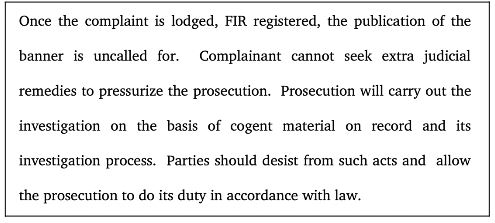
The court has weighed in other reasons including – delay in filing the FIR, the absence of a caste reference in the alleged conversation between teacher and principal, and allegations regarding the teacher’s poor performance.
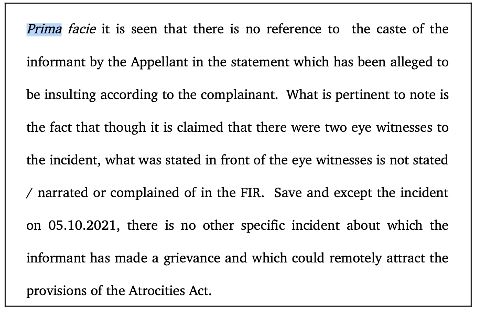
Featured Image: Review of Court Judgments


